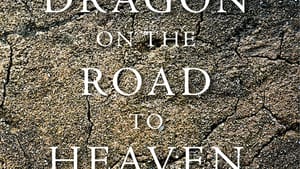Stay in the Loop
BSR publishes on a weekly schedule, with an email newsletter every Wednesday and Thursday morning. There’s no paywall, and subscribing is always free.
A home for fish and stars
‘Muddy Dragon on the Road to Heaven’ by Grant Clauser

As a child, visiting my dad’s home state of Washington, I remember going on hikes along shallow rivers and creeks and occasionally seeing salmon carcasses splayed on the banks. I learned that after Pacific salmon make the treacherous journey upstream to spawn, they become so malnourished and exhausted that they die. While I was troubled and saddened by this cycle, it also gave me an unexpected respect for salmon.
Similar contemplations of nature and existence fill Muddy Dragon on the Road to Heaven, a narrative poem collection by Pennsylvania author and Rosemont College professor Grant Clauser. He explores social and ecological struggles, nostalgia, family, and solitude, evoking wonder, beauty, and healing in a world that often feels broken.
A deep diver weeps
In this amalgamation of nature, science, history, and humanity, Clauser meditates on an impressive array of topics, like the discovery of an ancient fossil in China, fishing, and men weeping in their cars. He ruminates on the natural world with Thoreauvian and Emersonian sensibilities, but adds a contemporary tone of caution.
In a poem titled “2050” he writes, “I saw a deep diver weep on the news / when describing plastics on the ocean floor … Somewhere a whole herd of animals is perishing. What was ice for millennia, turns to water.” The power of these poems stems from Clauser’s gift for making the general and banal happenings of the world personal. “Every day we get better at pretending that the world is fine,” he continues in the same poem. “Pleasure in the sun. Pleasure in the garden. / I’m told the guards on death row / are taught to not say good morning / to the inmates, but secretly / some of them do anyway.”
The fish and the stars
Clauser observes each theme with a microscopic lens, using visceral imagery to evoke profound quandaries and feelings. Muddy Dragon commiserates with the struggles and heartache of existence. Some of the poems are inspired by true events, which add more poignancy to the collection. In the elegy “To the Girl Who Left a Message on a Satanic Hotline to Ask for a Miscarriage,” Clauser writes, “I’m not here to judge. Who hasn’t turned / to darkness when nothing else has an answer?”
Exhibiting deep empathy that connects us to that which is distant or absent from our minds, Clauser continues in the same poem, “I’m here because small trout with skin like jewels / make their whole lives in this water’s short / road home. And aren’t we like them? Rising / from nothing but hope with nothing before us / but a short run over the stones.” Despite the weight of this collection, it carries a pervasive tone of hope that is both realistic and reassuring: “Please tell me you fought back that black night, that the click / at the end of the line was the first step / in your hard run back to your life and know / that even though your world may sometimes / be dark, that’s where the wisest trout live, / growing old and fat despite the cold.”
This reminds me of the Pacific salmon, who after years at sea attempt to make their way back to the shallow water where they were born. The concept of finding our way home is universal, even though “home” itself may be hard to define. Despite the struggle and uncertainty of this existence, we instinctively move forward in hopes of eventually settling where we belong.
I was born in The Philippines, a country whose people have been dispersed throughout the globe mainly due to colonization, imperialism, and the supply and demand of Overseas Filipino Workers. Despite the fact that “finding home” sometimes feels like a dark cloud looming over my head, Clauser’s words comfort me in my ambiguous journey forward. In “The stars, that nature hung in heaven, and filled their lamps with everlasting oil, give due light to the misled and lonely traveler” (named for a John Milton quote), he writes, “All travel circles back until we run dry / and settle into our original dust. / These stars, scattering since the big bang, / are just trying to find their way home.”
Odes to hope
As spring arrives, amidst a pandemic that continues to ebb and flow, the transition into summer fills me with simultaneous dread and excitement. It is easy to feel consumed by fear and tragedy in this world, but Muddy Dragon on the Road to Heaven offers abundant hope.
In “Ode to the Light at the End of the Tunnel,” Clauser writes, “Let’s look harder, squint if we have to / for the light to find us … And even though it may be far, / the distance yet too great to measure, / let’s praise the light, / even though it may be false, / may be just the reflection of our own light on a broken piece of glass, / it still gives us / someplace to go.”
Despite how trite or exhausting hope can sometimes feel, it should never be underestimated, because it could be the one thing we need to keep moving forward.
Image description: The cover of Muddy Dragon on the Road to Heaven, by Grant Clauser. The words of the title appear in large white letters over a photo of what looks like a cracked rock face, or a landscape with parched cracks in dried mud.
What, When, Where
Muddy Dragon on the Road to Heaven. By Grant Clauser. New Paltz, New York: Codhill Press, August 1, 2020. 79 pages, paperback; $16. Get it on the Codhill Press website.
Sign up for our newsletter
All of the week's new articles, all in one place. Sign up for the free weekly BSR newsletters, and don't miss a conversation.

 Kelly Conrad
Kelly Conrad